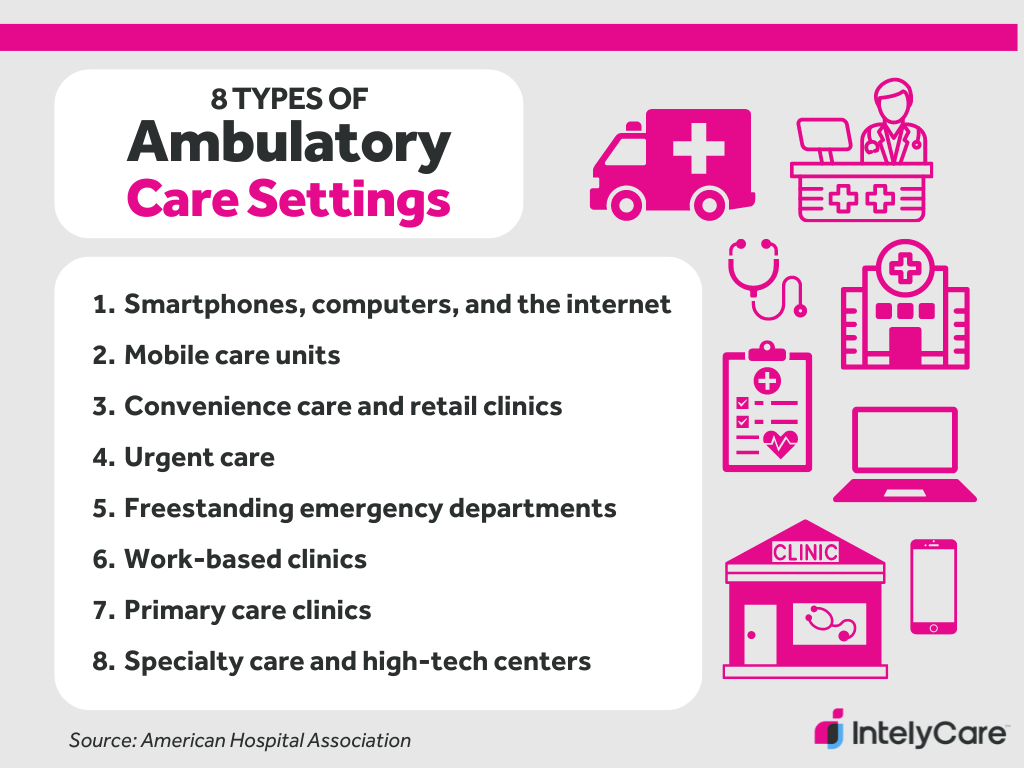Ambulatory Care Nursing: Career Guide

Ambulatory medicine is the bridge between home and the hospital. In ambulatory care nursing, you could work in outpatient clinics, procedural areas, and more. While the pace may differ from acute care, 90% of medical care is delivered in outpatient settings like these.
But what exactly is ambulatory care? The term “ambulatory” is a descriptive word that means that someone is able to walk. But this is a bit of a misnomer since patients can come to ambulatory care in wheelchairs or with assistance.
Essentially, this field aims to improve care access and efficiency, supporting patients’ ability to live at home and get the healthcare they need while remaining mobile. Ambulatory care is crucial for disease prevention, treatment, education, and population health management.
If you’re a nurse interested in learning more about community health and outpatient medicine, ambulatory care nursing might be just the specialty for you. Here’s why ambulatory nursing is so important and how to enter this field.
Ambulatory Care Nursing: Overview
Ambulatory care nurses are essential team members in outpatient care centers. The American Association of Ambulatory Care Nursing (AAACN) has created a comprehensive definition of ambulatory care nursing. Here’s a summary:
Ambulatory care is a specialized field combining collaborative and independent practice. Ambulatory care nurses care for individuals, groups, and populations seeking health assistance or care for health-related issues in outpatient settings. This care ranges from promoting wellness and managing acute illnesses to supporting patients with chronic diseases and disabilities. Ambulatory care nurses use evidence-based practice to guide care and improve patient outcomes by adhering to professional standards.
Because ambulatory care is a bit of a catch-all term for outpatient medical settings, the skills and experience of ambulatory nursing are very different across care centers. Patients in outpatient centers come in with a range of needs and illnesses, and nurses in these settings still need specialized skills to give patients the best outcomes.
What tasks does ambulatory care nursing involve on a daily basis? Examples of nursing skills you might use in a shift in this specialty include the following:
- Focused and head-to-toe assessments
- Health screenings
- Vaccine administration
- Patient education
- Blood draws
- Wound care
- Documentation in the EHR
- Communicating with case management, medical providers, and family
Benefits and Drawbacks of Ambulatory Care Nursing
Benefits
- Schedule: Most outpatient, telehealth, and community health clinics operate on an office schedule, so you’re more likely to be off work on weekends and holidays.
- Patient acuity: Since ambulatory care patients are generally less sick than patients in the hospital, the work may be less stressful.
- Gratification: Promoting preventative care gives you a chance to make a long-term difference in the health of your patients.
Drawbacks
- Work-life balance: While you might enjoy the office schedule and pace, it may mean that you’ll work more days of the week than your peers who work 12-hour shifts in med-surg or critical care.
- Different skills: Depending on your area, you’ll likely perform fewer hospital nursing skills, such as Foley insertion and IV medication administration. But on the other hand, you may do more education and health promotion.
Where Could You Work as an Ambulatory Care Nurse?

In this role, you can work anywhere that patients access care on an outpatient basis. There’s no one model for ambulatory care. Technology has helped expand models of access, and there are now eight types of ambulatory care settings laid out by the American Hospital Authority. As an ambulatory care nurse, you might work in one or more of the following areas:
- Smartphones, computers, and the internet: Patients access providers through medical websites and remote portals.
- Mobile care: Converted buses are modes of access for patients who otherwise might not be able to access care. These come equipped with technologies and patient-monitoring equipment.
- Convenience care and retail clinics: These are typically inside retail stores, where patients can get limited treatment from mid-level providers.
- Urgent care: These clinics offer small lab assessments, sutures, and general radiography, and see patients on a scheduled or walk-in basis.
- Freestanding emergency departments: These fall between urgent care and emergency departments. They’re typically open 24/7 and don’t have the diagnostic capabilities of EDs.
- Work-based clinics: Work and occupational health centers are increasingly common for manufacturing and tech companies. These help keep employees healthy while maintaining productivity.
- Primary care clinics: The team-clinic model helps patients access a group of specialists in one visit. Some of these clinics have diagnostic capabilities and are linked to larger health systems.
- Specialty care and high-tech centers: These centers help treat patients who need specific care on a weekly or monthly basis, offering treatments such as dialysis, infusion, diabetes management, and more.
How to Enter Ambulatory Care Nursing: 4 Steps
If you’re interested in joining this specialty, there are four steps you’ll need to take to start practicing.
Step 1: Go to Nursing School
No matter which nursing specialty you pursue, the path to becoming an RN begins with a prelicensure nursing program. An Associate Degree in Nursing (ADN), offered in two-year technical schools and community colleges, is the fastest option. If you’re looking for a longer, more expensive degree path that gives you more career mobility, consider a Bachelor of Science in Nursing (BSN). Learn more about ADN vs. BSN degrees and how to choose which is right for you.
In nursing school, you’ll learn essential skills like assessment, documentation, and the nursing process. You’ll also take challenging courses like pathophysiology, pharmacology, nursing assessment, and more.
Step 2: Pass the NCLEX-RN
The National Certification and Licensure Exam for Nurses (NCLEX-RN) assesses your readiness to practice as a new nurse. It tests your clinical judgement, with drop-down, matrix grid, multiple-choice, and other question formats. You’ll receive between 74 and 145 questions, depending on how you answer. Take your time preparing for the NCLEX so you can pass on the first try.
Step 3: Gain Ambulatory Care Experience
Once you have your license, you’ll be able to enter ambulatory care nursing as a new graduate nurse, but some new graduates prefer to get acute care experience first. One of the benefits of entering the field in a hospital is that you’ll be able to participate in a residency program. These programs are structured to give you more support and supervision as you build critical thinking skills and transition into professional nursing.
On the other hand, some nurses never work in acute care, and it’s not a requirement for practice. If ambulatory care is where you want to be, you can jump right in. Find outpatient nursing roles today.
Step 4 (Optional): Become a Certified Ambulatory Care Nurse
Once you have experience in the specialty, you can advance your career with a certification. The Ambulatory Care Nursing Certification (AMB-BC) is the national credential for ambulatory care nurses. In order to sit for the exam, you’ll need to meet the following eligibility criteria:
- Current RN license
- 2 years of full-time nursing practice
- A minimum of 2,000 hours of practice in ambulatory care in the past 3 years
- 30 hours of continuing competency in ambulatory care nursing in the past 3 years
Ambulatory Care Nursing Salary
The average outpatient center salary for RNs is $107,650 per year. However, this amount can vary depending on experience, location, specialty, and credentials. If you’re willing to relocate to certain areas, you could earn more. Check out nursing jobs in some of the highest-paying states for RNs:
Ambulatory Care FAQ
Why is ambulatory care important?
Ambulatory care helps decrease the burden and expense on hospitals and acute care systems by preventing and treating illnesses before they worsen. In studies, ambulatory care programs help reduce care fragmentation, which is when a patient’s care is spread unnecessarily across providers, creating gaps and increasing costs. Ambulatory care also makes healthcare systems more sustainable. By working in this area, you’ll be helping to improve care for patients.
What is an example of ambulatory care nursing in action?
Let’s say an elderly female patient is having chest pains rated at 6/10 on the pain scale, and she’s evaluating her care options. She can either go to the emergency department, which is an hour away, or try out a new stand-alone urgent care center near her local mall.
If she goes to the emergency department, she knows she’ll face long wait times and may even have to stay overnight to get seen by a provider. She’s also worried about getting sick in a crowded ER waiting room, and she’s fairly certain her chest pain isn’t an emergency. Given her options, she chooses to go to urgent care.
Once she gets there, she checks in with the triage nurse and waits 20 minutes before being seen by a nurse practitioner, who orders an electrocardiogram (ECG) and blood work. The NP concludes she is experiencing stable chest pain, likely resulting from coronary artery disease. The patient is sent home with a referral to a cardiologist. This is ambulatory care in action — faster, more accessible care that uses fewer resources and connects patients to specialists when necessary.
Ambulatory care vs. outpatient care: What’s the difference?
While the terms sound different, they represent the same model of patient care. Any time a patient accesses medical treatment without being admitted to the hospital, they’re experiencing the benefits of ambulatory and outpatient care.
Ambulatory care vs. primary care: What’s the difference?
Primary care is a model of ambulatory care. In primary care clinics, healthcare teams build partnerships with patients to help them understand, maintain, and monitor their health. These clinics are essential centers for health promotion, illness treatment, and prevention.
Looking for Ambulatory Care Nursing Opportunities?
If you’re seeking your next nursing opportunity, IntelyCare has outpatient nursing roles across the nation. Get tailored job listings sent right to your inbox.


